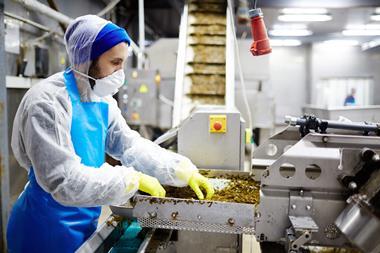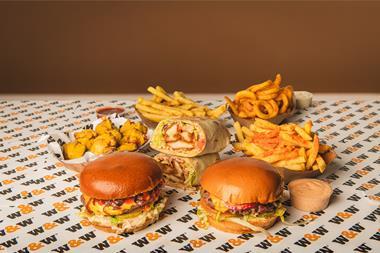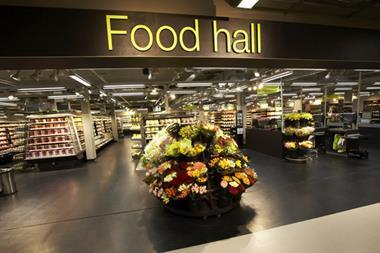The Grocer this week launches a pioneering survey benchmarking the performance of the own label sector. We asked buyers in the supermarket and independent sectors to tell us who their best own label suppliers are - and to detail their strengths
Heaven forbid that own label suppliers would ever complain about anything. But if they did, it would surely be that they remain the unsung heroes of our industry.
Thanks to the pioneering work of suppliers and their customers, almost half of all the groceries bought in this country today are own label goods.
No longer the poor relation to big brands, own label has long been recognised as a dynamic part sometimes the most dynamic part of the British retail scene. And suppliers would probably be right to grumble that they often don't get the praise they deserve for that achievement.
But from this week all that changes with the launch of a major industry survey by The Grocer.
For the past three months, we have been polling the top buyers in the supermarket and independent retail sectors. We asked these buyers to nominate their best own label supplier in each of 10 different categories. They then marked the performance of suppliers out of 10 in seven critical areas: account management skills, reliability of deliveries, consistency of product quality, value for money, ability to work with the buyer to develop the own label brand, new product development skills, and crisis management skills.
This is the first time anybody has tried to conduct such a survey. But we felt it would prove invaluable for both suppliers and buyers looking for an impartial benchmarking tool.
The idea was embraced by Asda, Booker, the Co-operative Group, Londis, Nisa-Today's, Safeway, Sainsbury, Somerfield and Tesco, which all took part in our survey. Given that these companies together account for almost 60% of the British grocery market, this is an incredibly powerful jury. We would like to thank them for their help in making this survey happen.
Every buyer was given equal weighting. The Grocer collated all their nominations and scores to compile a true pan-industry assessment of the best own label suppliers in the business.
Our survey reflects the feelings of buyers throughout the industry. The only way a supplier could get on our list was if it was voted for by one of its major customers. So just to be listed is a fantastic achievement.
However, a handful of suppliers have managed to go a stage further. They are clearly performing so well that buyers in rival organisations, often in different trade channels, have nominated them for our listing. We have called these companies our Best in Class 2001 because, let's face it, that's what they are.
You have got to be getting plenty of things right to get the thumbs up from so many customers, at the same time, in such a fiercely competitive market. So we felt it was right to show just how well these companies are performing. We have printed the average scores they received in each voting criteria. It's an industry view of how well these companies do in some pretty crucial areas of their business.
In some product categories, no company managed to win more than one nomination. So while there are plenty of firms out there who are clearly made of the right stuff, there are no Best in Class operators in some areas (at least on our definition).
Sure the voting was subjective. After all, one person's eight may be another's nine. But we were surprised to see that buyers tended to deliver very similar scores.
And that helps explain why the total scores for our Best in Class 2001 companies are so tightly clustered.
So what do our results tell us? Well, it's clear that no matter what the category, the best suppliers are viewed in pretty much the same way by their customers. And if you don't appear on our listings, you should first ask yourselves Why not'? Then you should take a hard look at the scores being recorded by our Best in Class candidates. Ask yourself how your company would compare. Do you think you would get a perfect 10 from such a critical audience? Many companies featured in this report did. And SCA received two perfect scores. Even buyers who didn't vote for SCA readily acknowledge its reputation in the vital areas of reliability and consistency.
And that, in a nutshell, is the raison d'être for this survey: celebrating excellence. As Stuart Mitchell, trading director of Sainsbury, says: "As an industry we are very well served by suppliers and we think ours are doing an excellent job."
He adds: "The supermarkets in this country have worked very closely with suppliers to create the competency that in turn has led to us having the best own label companies in the world. Other countries would die for an own label business like ours."
You can understand why Mitchell and his rivals are so passionate about this issue. Own label is a vital part of their product mix so they are keen to work only with those suppliers that can deliver the goods.
And as our survey clearly demonstrates, size is not an issue when it comes to meeting the demands of buyers. While bigger suppliers dominate the Best in Class listing, the overall picture is far more fragmented, with nominations for an impressive number of smaller companies, and firms with relatively low profiles.
Take Yeo Valley, which was rated highly by buyers scoring the same as major player Dairy Crest.
"We have worked with Yeo Valley for many years and they are a great supplier to work with. They are an example of a great British supplier whose service levels, quality and food integrity are excellent," said one buyer.
Another smaller company that did well was Macaw.
One of the buyers who voted for the soft drinks supplier was quick to praise every facet of its operation.
"Their entire team is very switched on, helpful, and always gets back to you to answer queries. They also have a really good understanding of our strategy and they always come to meetings very well prepared."
The buyer adds: "Their service level is one of the top ones in my category and they work with us to find ways of improving it. They work on forecasting, and are trying to improve availability on palette type displays. They also work well with our depots in terms of booking slots.
"They are also prepared to work on short lead times, so are very flexible."
But one trading director says it's no surprise companies like Macaw did so well: "You would expect small suppliers who specialise in particular products to be considered top of the pile."
Over at Booker Cash and Carry, trading director Shaun Birrell agrees small can be beautiful but for a very different reason.
"Service is where we tend to suffer with the big manufacturers, especially on deliveries. We get let down regularly by the big boys and not by smaller companies.
"It's no good having the best products if you run out of stock. So we tend to pick smaller companies that really want to work with us on service, availability and quality," he says.
Some buyers highlighted solus deals as a way of getting better service from big companies particularly in areas notorious for supply and quality inconsistencies.
The rationale of such deals is simple enough: if you become any firm's number one customer, you should also become their number one priority.
Huw Edwards, Asda's general manager of bakery, says he has seen "massive improvements" in reliability from Allied Bakeries since the company became its lead supplier in bread.
"We have worked together on what we can do from our end to improve our product ordering and in predicting volumes more accurately.
"On their part, they have focused heavily on accuracy, which is quite an achievement in an industry not noted for its accuracy. As we upgrade our systems, we need more accurate distribution, and they have improved dramatically in less than a year. They are getting product there at the right time and in the right quantities."
Consistency and value for money are also being driven up.
If Allied's average score seems to be lower than you would have expected, that's because of particular difficulties with one of its other customers who nevertheless nominated it in this category.
Back at Asda, Edwards says: "We made Allied Bakeries lead supplier because we believe the only way to drive forward our business is by going into partnership."
Price can often be a flashpoint for buyers and suppliers.
But in our survey buyers seem more than happy that they are getting excellent value for money.
And sometimes they do not necessarily want the cheapest, as one non food buyer explains.
"McBride is not the cheapest supplier around. There are other companies which are cheaper, but they don't offer a one-stop shop," he says.
"If you look around, you may get things cheaper, but this can be more trouble than it's worth. There may be logistical issues which make the savings disappear. Also, quality may be variable with other companies."
The McBride and Allied Bakery stories also illustrate that retailers can be surprisingly tolerant of problems that disrupt their business so long as they are short-term issues. One buyer says: "Last year we had severe problems with McBride on availability as did the rest of the trade.
"I would have given them zero for this last year. We had problems such as not being able to get stock, problems with management of promotional volumes, lack of capacity in areas like dishwashing liquid."
Mike Handley, chief executive of McBride, acknowledges there were problems caused by a new supply structure that diluted the focus on customer requirements. "We have changed it back again, putting the focus back on customers and, since late last year, have had a rapid restoration of our previous service levels."
As our survey shows, buyers agree with Handley's assessment. And they also rate the company highly in areas such as account management skills, its ability to develop their own label brand, and its new product development capabilities.
Another company that did well when it came to npd was Heinz, which also scored consistently well across all seven of our judging criteria.
There's a very good reason it did well, says Marcel Hayden of Somerfield, one of those who voted for the company. "Heinz has taken the time to get close to our business and understand the different dynamics between our trading formats and customer profiles, resulting in products delivering excellent customer value and high quality."
Invergordon was one of those that did not fare as well on the npd front a tad harsh given its pioneering work developing organic gin and vodka in the past year or so.
One of those who voted for the company certainly had no complaints: "NPD is very difficult on standard liquids where being innovative is really all about packaging."
Perhaps the low score reflects the constant complaint of drinks buyers about a lack of innovation across the sector. For instance, one supermarket beer buyer told us: "Suppliers tend to be reactive. If you chase for npd they are up and running fast and always come up with something. But they don't want to take a risk on something they don't see as their brand."
Where Invergordon does score well is in areas such as account management skills and its ability to work with the buyer developing the own label brand. Sales director Allan Lowndes offers one reason why: "We have a good team that's well liked and very experienced between us we have 120 years in the drinks industry."
And judging from the comments of the buyers we spoke to, good people really do make a big difference. They tended to rate suppliers highly when it had high calibre people in place; people who are good at sorting out problems and coming up with new ideas to improve business for mutual benefit.
{{FEATURES }}
Close menu
- Home
- Retail & Wholesale
-
Products & Suppliers
- Back to parent navigation item
- Products & Suppliers
-
Product Categories:
- Back to parent navigation item
- Product Categories:
- Alcoholic drinks
- Bakery
- Cereals & breakfast
- Cheese
- Chicken & poultry
- Chocolate
- Confectionery
- Crisps, nuts & snacks
- Dairy
- Fish
- Fresh produce
- Frozen
- Household
- Meat
- Own Label
- Sauces & condiments
- Seasonal
- Soft drinks
- Vaping
- Vegan & plant-based
- World foods
- Suppliers
- People
- Reports & Data
-
Topics A-Z
- Back to parent navigation item
- Topics A-Z
-
Popular topics:
- Back to parent navigation item
- Popular topics:
- Cost of living crisis
- Crime
- Deposit Return Schemes
- Finance
- Government & Regulation
- Health
- Inflation
- Loyalty
- Marketing
- Mergers & Acquisitions
- New Product Development
- Sourcing
- Supply chain
- Sustainability & environment
- Technology
- Ultra Processed Foods
- Vaping
- A-Z all topics
- Content by type:
- Events
- Ask iA (beta)
- Subscribe now
Sign in to comment on this article
Not logged in before? Register for FREE guest access today.
You will be able to:
- Read more stories
- Receive daily newsletters
- Comment on stories
Advert

















No comments yet